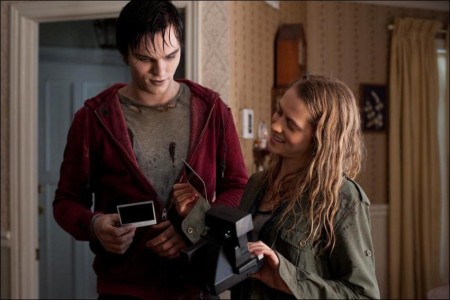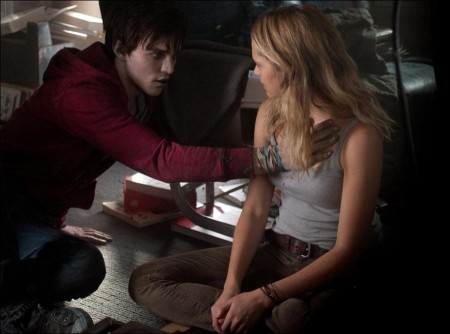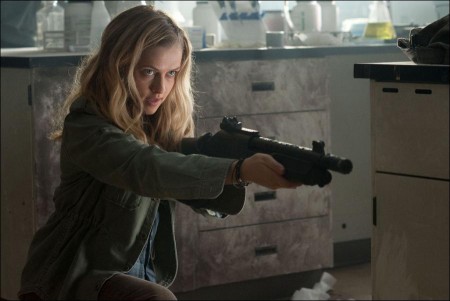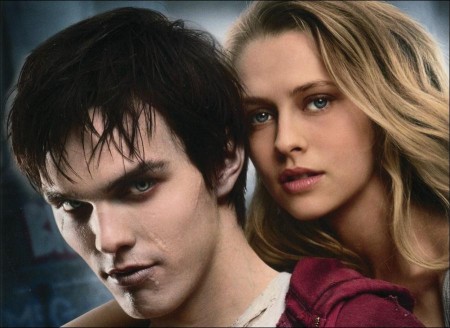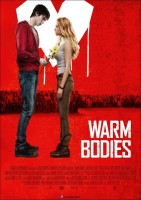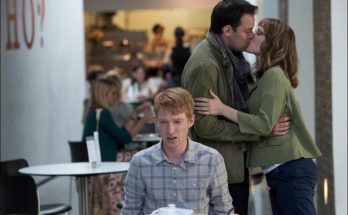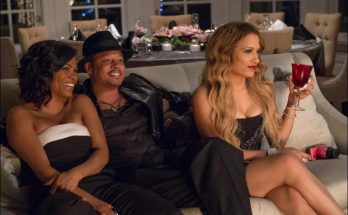Taglines: Bros before brains.
A funny twist on a classic love story, this is a tale about the power of human connection. After a zombie epidemic, R (a highly unusual zombie) encounters Julie (a human survivor), and rescues her from a zombie attack. Julie sees that R is different from the other zombies, and as the two form a special relationship in their struggle for survival, R becomes increasingly more human – setting off an exciting, romantic, and often comical chain of events that begins to transform the other zombies and maybe even the whole lifeless world.
Zombies love people, especially their brains. But R (Nicholas Hoult) is different. He’s alive inside, unlike the hundreds of other grunting, drooling undead—all victims of a recent plague that drove the remaining survivors into a heavily guarded city. Now the Zombies roam about an airport terminal, searching for human prey and living in fear of the vicious Boneys, the next undead incarnation.
One day, R and his best friend M lumber toward the city in search of food. There, R first sets his eyes on Julie (Teresa Palmer), a beautiful human. Determined to save her—first from the other Zombies and then from the Boneys – R hides her in his home, a cluttered 747 aircraft. Julie is terrified, and R’s grunted assurances of “Not…eat” do little to calm her. But when R begins to act more human than Zombie, coming to her defense, refusing to eat human flesh, and even speaking in full sentences, Julie realizes that R is special.
After a few close calls with the Boneys, and with her father mounting an armed search for her, Julie realizes she can’t hide forever. So she sneaks back home, leaving R broken-hearted. Desperate to see her, R decides to comb his hair, stand a little straighter, and impersonate a human long enough to get past the city guards. If only he can prove to the humans that Zombies can change, maybe R and Julie’s love might stand a chance. But with the rampaging Boneys heading toward the city and Julie’s father intent on killing R and his Zombie friends, the stage is set for an all-out battle between the living and the undead.
About the Feature (2013)
WARM BODIES began life as a seven‐page online short story titled “I am a Zombie Filled with Love” that attracted a wide Internet audience and led author Isaac Marion, with some encouragement, to expand it into his debut 2010 novel. Described as a “zombie romance” by the Seattle Post Intelligencer, complete with allusions to Shakespeare’s “Romeo and Juliet,” the novel captivated producer Bruna Papandrea (MILK, ALL GOOD THINGS).
“As a piece of writing, it was so elegant and beautiful,” says Papandrea, who at a friend’s recommendation got hold of the book before it was published and read it from cover to cover during a flight. “It had such an incredibly strong voice and character. Although it was a genre piece, it was an incredibly emotional, character-driven story.”
Papandrea, who had just started her own production company, Make Movies, immediately set about securing the film rights, and three days later she was in Marion’s hometown of Seattle to meet with the writer. Soon afterwards she sent the manuscript to some of her closest studio contacts, including Erik Feig, a production executive at Summit Entertainment.
“It was a little astounding how fast they responded,” Papandrea recalls. “Within weeks, they told me they wanted to make the movie and were optioning the book.”
In part Papandrea and others were drawn to the novel’s portrayal of a post-apocalyptic world from the viewpoint of the zombies themselves.
“I’d never heard anyone treat these creatures as individuals, something that would have a perspective,” Marion says. “They’re always used as props in the background that come rushing at the human characters. They’re anonymous and mindless.”
Instead of the typical black-and-white, all-or-nothing, human-or-zombie portrayal of the conflict between living and undead, Marion chose to explore the gray areas in between — how a person transitions into becoming a zombie and then back to being human. “That concept really fascinated me,” he says.
In a strange way, Marion says his novel was not only personal, but even a little autobiographical. “As I developed this story, I started to notice parallels with what was going on in my life at the time,” he explains. “I was coming out of this period of being very emotionally detached, cynical and living in a lifeless state. It became a fairly thinly veiled metaphor for that process that I went through.” With Summit on board, Papandrea next took the project to writer-director Jonathan Levine (50/50, THE WACKNESS), whose initial resistance to doing a movie based on a young adult novel waned when he saw how wildly creative the book was.
“I identified with the main character, and the book Isaac wrote really allowed for these incredible directorial flourishes and aggressive style,” Levine says. “I was excited about the opportunity to push the envelope visually, and it was a great character piece, as well. It’s an adventure. It’s a romance. It’s got comedic elements. It’s got horror elements.”
Collaborating closely with Marion, Levine went on to write the screenplay for the film. He says he saw the love relationship between R and Julie at the heart of the story as a “mash-up” of “Romeo and Juliet” and “Frankenstein.”
“The arc of their relationship was the most important thing to me to get right directorially — the push and pull of guys and girls, the way relationships start and people are nervous at first, maybe even repulsed, and then come together,” he says.
For producer Todd Lieberman (THE FIGHTER, THE PROPOSAL), Levine was a great pick for director. “It’s a zombie genre film, there’s a love story, but it also happens to capture a unique, self-aware, self-referential, humorous tone,” he says. “Jonathan is tailor-made to do something like that.”
As for the film’s larger themes, the filmmakers say it follows in the tradition of zombie movies that make a social commentary, including George Romero’s Night of the Living Dead, but with some key twists that make it especially original.
“The salient theme at the heart of it is that people have forgotten what it means to be human and, through the interaction of these two characters, other people re-learn what it means to be human,” Levine says. “Not just the zombies, but the humans, too.”
Despite the existence of the so-called “Boneys” — a more advanced breed of zombie that is beyond the point of no return — WARM BODIES also features less gore and physical disintegration than many other films in its genre.
“I don’t even look at it, really, as a zombie movie,” Levine says. “I look at it as a monster movie that turns into a love story. We’re working within the zombie mythology, but we’re using that mythology as a means to an end, as shorthand for something else.”
Part of that shorthand is the startlingly original conceit — and recurring structural device — of having the zombies relive the memories of their human victims by eating their brains. To wit: R falls in love with Julie by reliving her boyfriend Perry’s memories through ingesting his brains. “It’s such an amazingly unique way to fall in love with someone,” Papandrea says.
In casting the movie, the filmmakers pulled together a blend of seasoned actors and relative newcomers. For the role of the film’s undead romantic lead R, they cast British actor Nicholas Hoult (ABOUT A BOY, A SINGLE MAN), after seeing his work on the envelope-pushing British TV drama SKINS.
“He was sensational; the performance was just so strong,” says Papandrea of Hoult’s work in SKINS. “He had an intensity to his face and gesture that was remarkable.” For his part, Hoult says he was drawn to the challenge the role presented. “The idea of this zombie who I have to try to make an audience care about and root for, that was interesting to me,” he says. “In the script, he was very funny and eloquent in his voiceover, so there was a charm about him and a humor as well.”
Hoult, who found Marion’s book “a fantastic read” and Levine’s adaptation “a real page-turner,” describes the character of R as a zombie who feels trapped and lonely, stumbling around the abandoned airport that is his home and wanting more from life.
“The most compelling thing about R is his need to connect,” Hoult says. “He wants to connect with the other zombies in the airport, even though they’ve got nothing to really say to him and can’t even say their names. He wants to connect with Julie and to feel alive. That’s one of the most human instincts ever — to want to feel a part of something and to connect with another human.”
One of the challenges of the role was the fact that, at least initially, R cannot speak in words — a condition that gradually changes as the story progresses.
“A lot of the time I had to communicate just through movement, my eyes, the things I do, or the records R plays for Julie,” Hoult says. “The idea of not being able to say what you’re thinking was something that was exciting for me. It makes you think in a slightly different way than you normally would.”
For the role of R’s human love interest, Julie Grigio, the filmmakers chose Australian-born Teresa Palmer (I AM NUMBER FOUR) from a shortlist of five actresses who made it through to read with Hoult.
“There’s something about Australian actresses, a confidence and strength,” says Papandrea, who is an Aussie herself. “It’s a very hands‐on approach over there, a little different from America. It’s difficult to find a girl who is young, very beautiful and has vulnerability, but also is such a fireball.”
Those qualities perfectly equipped Palmer to play the role of Julie. “She’s a warrior,” Palmer says of her character. “She’s strong and has an amazing energy. She’s bubbly; she’s got a big spirit and a good heart. Things have really been dimmed for her since her mother was killed by one of the zombies. She’s unhappy. Then she meets R. He breathes life back into her. They fall for each other and she’s reminded of what life can be like and starts to hope again, which is a really beautiful thing. ”
But it wasn’t love at first sight for Julie and R, who meet under the most violent of circumstances. When R saves Julie from the other zombies and takes her back to his lair in an old airplane at the abandoned airport, Julie figures he’s just storing her as a snack for later. But she begins to soften when R starts to look after her by bringing her blankets and food. And so the seeds of their unlikely romance are sown.
Although Marion insists the film is not “Romeo and Juliet” with zombies, he admits that the Shakespeare classic informs some of the film’s subtext. There’s even a balcony scene and — in what is surely a first in the genre — a romantic kiss between the zombie R and his human object of desire, Julie.
Levine admits the balcony scene is a nod to “Romeo and Juliet” and says it was fun to shoot — even though he had doubts about it: “It was a scene I wasn’t always sure about, to be honest, because it kind of comes at this point in the script when we’re transitioning from the first to the second half of the movie, which is a little broader. It was always a tonal shift that concerned me. But I watch it now and I’m really happy with it.”
For the role of General Grigio, Julie’s cold, dogmatic father and the leader of the human survivors, the filmmakers were thrilled to land landed John Malkovich (DANGEROUS LIAISONS, BEING JOHN MALKOVICH). “It’s a smaller role in the context of the other roles in the movie but it’s incredibly important,” says Papandrea. “We really needed someone who immediately came on the scene and had gravitas. I honestly could not imagine else who could play that role.” For his part, Malkovich says he was attracted by the film’s storytelling. “I especially liked the two main characters and the way the story unfolds. In the writing of the screenplay based on the novel, there’s still quite a novelistic approach that I liked.”
Although the actor shared something of a father-daughter dynamic with Palmer off-camera, Malkovich says the General and Julie are in intense opposition on screen. “He ups the pressure on Julie and what she’s feeling and thinking, because her father is in charge of exterminating the group which her love object happens to belong to.”
But even General Grigio evolves eventually. “That’s really in the very last frames of the film,” Levine explains. “It’s a sudden conversion, based on something he sees that he’s never seen before.”
The filmmakers turned to THE DAILY SHOW WITH JON STEWART alumnus Rob Corddry (HOT TUB TIME MACHINE) to play the character of R’s best friend, M, which Levine describes as one of the film’s most critical roles. “M, in many ways, is the heart of the movie,” Levine says. “R’s change sparks everything, but M’s change is representative of everyone else.”
For Corddry, who also read Marion’s novel, the role of M was much more interesting than the average “best friend” role. “Those guys are usually just straight plot devices,” Corddry says. “I actually get to change. I might be the only best friend in movie history that has his own trajectory.”
Ironically it was the simplicity of the role that gave Corddry the most angst initially. The actor likes to do a lot of preparation around his character’s back story to stave off anxiety. “If I feel like I have a lot of subtext, I’m not going to be worried when I’m shooting,” Corddry says. “But I couldn’t do that this time. I had to be prepared in the moment. This movie was an exercise for me in really being present every time the cameras rolled.”
Palmer says Corddry’s character, while lovable and hilarious, has some pretty complex aspects. “He’s the most sexual of the zombies that we meet,” she says. “He wants to eat humans and he doesn’t understand what’s going on with him. He can’t quite wrap his head around the idea that R has taken this human girl hostage and is now falling in love with her. He finds it bizarre and strange, but he loves R so he goes along with it. There’s also a hint of jealousy in there too, at one point.”
Dave Franco (21 JUMP STREET, SUPERBAD) plays the role of Perry, Julie’s high school sweetheart who becomes R’s lunch early in the movie. Papandrea says that in many ways the actor was the greatest discovery of the movie.
“He’s just starting to break out,” she says of Franco, who is the younger brother of actor James Franco (127 HOURS, SPIDER-MAN). “He just lights up the screen and he’s a joy to be around. He’s a very inquisitive actor and person. I think that really comes across in the character of Perry.”
“He has to make a very big impact in a very short time and he really does it,” adds Levine. “He’s so charming and likeable, and so talented, that he sticks with you throughout the movie.” Perry starts off as a naïve young man who is madly in love with Julie, but then becomes obsessed with killing zombies after he witnesses them killing his father. Although Perry doesn’t last long, his memories of doomed love affair with Julie — experienced second-hand by R — form a crucial through-line of the film.
“I actually get killed off within the first 10 minutes of the movie and the rest of my story plays out in flashbacks,” Franco explains. “It affects R’s relationship with Julie. From the start, we’re desperately in love with each other and going through all this together. By the end Perry completely loses sight of that because he’s so single minded, and their relationship starts to disintegrate.”
Franco speculates that Julie may be drawn to R because she sees some of Perry in him. “I feel like he reminds her of how Perry was when they first met — this very innocent, sweet relationship,” he says.
Finally, for the role of Julie’s best friend, Nora, the filmmakers cast Analeigh Tipton (CRAZY, STUPID, LOVE.; THE GREEN HORNET) — a casting decision that had producer Todd Lieberman’s full support.
“Analeigh blew me away in CRAZY, STUPID, LOVE.,” he says. “She was a stand out in that movie. Finding an accomplished comedic actress in that age range is difficult. Analeigh came in and read for the part and nailed it.”
For her part, the actress says her character is “a bag of fun” who combines wit with a talent for killing zombies. She also provides something of a pragmatic foil for Julie’s romantic tendencies.
“When Nora discovers Julie has fallen for a zombie, she freaks out,” Tipton says. “Like any good friend would be, she’s concerned that her best friend is falling in love with someone that could eat her brains. But she comes around because she trusts Julie.”
Tipton says Nora’s worldly ways may be a form of self‐preservation at times. “She approaches situations with dry humor instead of really dealing with them — or her feelings,” the actress says. “She tries to make everything no big deal. She’s so strong and doesn’t give a damn. That’s fun, to be really out there, especially for a female character.”
Warm Bodies (2013)
Directed by: Jonathan Levine
Starring: Nicholas Hoult, Teresa Palmer, Analeigh Tipton, Rob Corddry, Dave Franco, John Malkovich
Screenplay by: Jonathan Levine, Isaac Marion
Production Design by: Martin Whist
Cinematography by: Javier Aguirresarobe
Film Editing by: Nancy Richardson
Costume Design by: George L. Little
Set Decoration by: Suzanne Cloutier
Art Direction by: Gilles Aird, Jean Kazemirchuk
Music by: Marco Beltrami, Buck Sanders
MPAA Rating: PG-13 for zombie violence and some language.
Studio: Summit Entertainment
Release Date: February 1, 2013
Visits: 76
